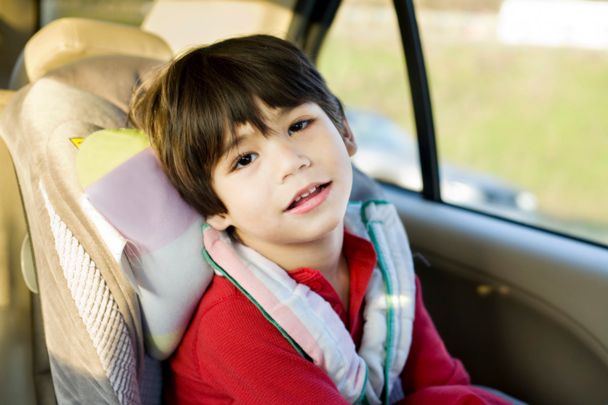The holiday season brings cherished moments with family and friends, but for parents of children with cerebral palsy, traveling can pose unique challenges. From packing essential items to planning for accessibility, a little preparation can make your holiday journey smoother and more enjoyable for everyone. Here are some practical travel tips to help you navigate holiday travel with confidence and ensure a comfortable experience for your child with cerebral palsy.
1. Plan Ahead for Accessibility
Before heading to your destination, call ahead to confirm accessibility accommodations. Whether you’re traveling by car, plane, or train, ask about facilities like accessible restrooms, elevators, or ramps. For air travel, notify the airline in advance of any special needs to ensure wheelchair access, priority boarding, or other assistance. Many airlines and transportation services have policies to make travel easier for families with disabilities, but these often need to be arranged in advance.
Helpful Tip:
Request aisle seats for more room if you’re flying, or seats near an exit for easier access if you’re taking the train.
2. Bring Essential Equipment and Comfort Items
Traveling with cerebral palsy may require additional equipment to ensure comfort and mobility. Don’t forget essentials like wheelchairs, walkers, or any braces and orthotics that your child uses regularly. Pack comfort items, such as favorite pillows, blankets, or sensory toys, to help them feel more at ease in unfamiliar surroundings.
Suggested Packing List:
- Wheelchair or mobility device
- Braces, orthotics, or other supportive equipment
- Extra batteries or chargers (for powered devices)
- Favorite comfort items (blanket, stuffed animal, etc.)
- Portable snacks and drinks for quick energy boosts
3. Prepare Medications and Medical Supplies
If your child takes medication or has specific medical needs, ensure you have an adequate supply for the trip and bring extra, if possible. Pack medications in their original containers and place them in an easily accessible bag for quick retrieval. It’s also a good idea to carry a copy of your child’s medical information, including prescriptions and contact information for their healthcare providers.
Essential Medical Supplies:
- Daily medications and extras
- Emergency contact information
- Medical documentation and prescriptions
- Portable medical devices (like nebulizers if needed)
4. Schedule Frequent Breaks
Long periods of sitting can be uncomfortable for children with cerebral palsy, especially those with high muscle tone. Schedule regular breaks to allow your child to stretch, move, and reset. If you’re driving, plan stops at rest areas along the way. If you’re flying, consider taking walks down the aisle when safe to do so, or finding quiet areas in the airport to relax before boarding.
Pro Tip:
Allowing time for stretching or light movement during breaks can reduce muscle stiffness and make the journey more pleasant for your child.
5. Create a Sensory-friendly Environment
Holiday travel can be overwhelming for children with sensory sensitivities. Crowded airports, loud noises, and bright lights can lead to overstimulation and stress. Bring noise-canceling headphones, sunglasses, or sensory toys to help your child cope with these stimuli. Some families also find it helpful to bring a weighted blanket or lap pad, which can provide comfort and a sense of security.
Helpful Item Suggestions:
- Noise-canceling headphones
- Sunglasses to reduce light sensitivity
- Weighted blanket or lap pad
- Fidget toys for sensory engagement
6. Prepare Your Child for the Journey
Explaining what to expect during the trip can ease anxiety for many children. Talk to your child about the different parts of the journey, such as going through security at the airport, boarding a plane, or making stops along a long car ride. Visual aids, like pictures or videos of airports and airplanes, can help familiarize them with new environments and reduce any fears or uncertainties.
Tip for Younger Children:
Use a social story to walk through each step of the travel process. This can be especially helpful for children with limited communication abilities.
7. Practice Patience and Flexibility
Traveling with children often comes with unexpected changes, and for parents of children with cerebral palsy, flexibility is key. Allow extra time for each step of the journey, whether it’s passing through airport security, loading the car, or navigating a busy rest stop. Building in time for adjustments can help keep stress levels low and allow you to handle any surprises with ease.
Reminder:
It’s okay if things don’t go exactly as planned — focus on enjoying the journey and making memories along the way.
8. Know When to Ask for Help
Many airports, train stations, and other facilities offer support services for families with children with disabilities. Don’t hesitate to reach out for assistance, whether you need help with luggage, navigating the airport, or finding accessible amenities. Many people are happy to lend a hand to make your travel experience easier.
Extra Tip:
Look for programs like TSA Cares, which offers additional support for travelers with medical conditions or disabilities.
Traveling with Confidence and Joy
As you prepare for the holiday season, remember that thoughtful planning and a flexible mindset can help make travel more enjoyable for everyone. Dr. Siambanes and the team at Children’s Cerebral Palsy are dedicated to supporting families year-round, helping children with cerebral palsy gain greater independence and mobility through specialized orthopedic care.
We wish you safe travels and a joyful holiday season filled with special moments together.






